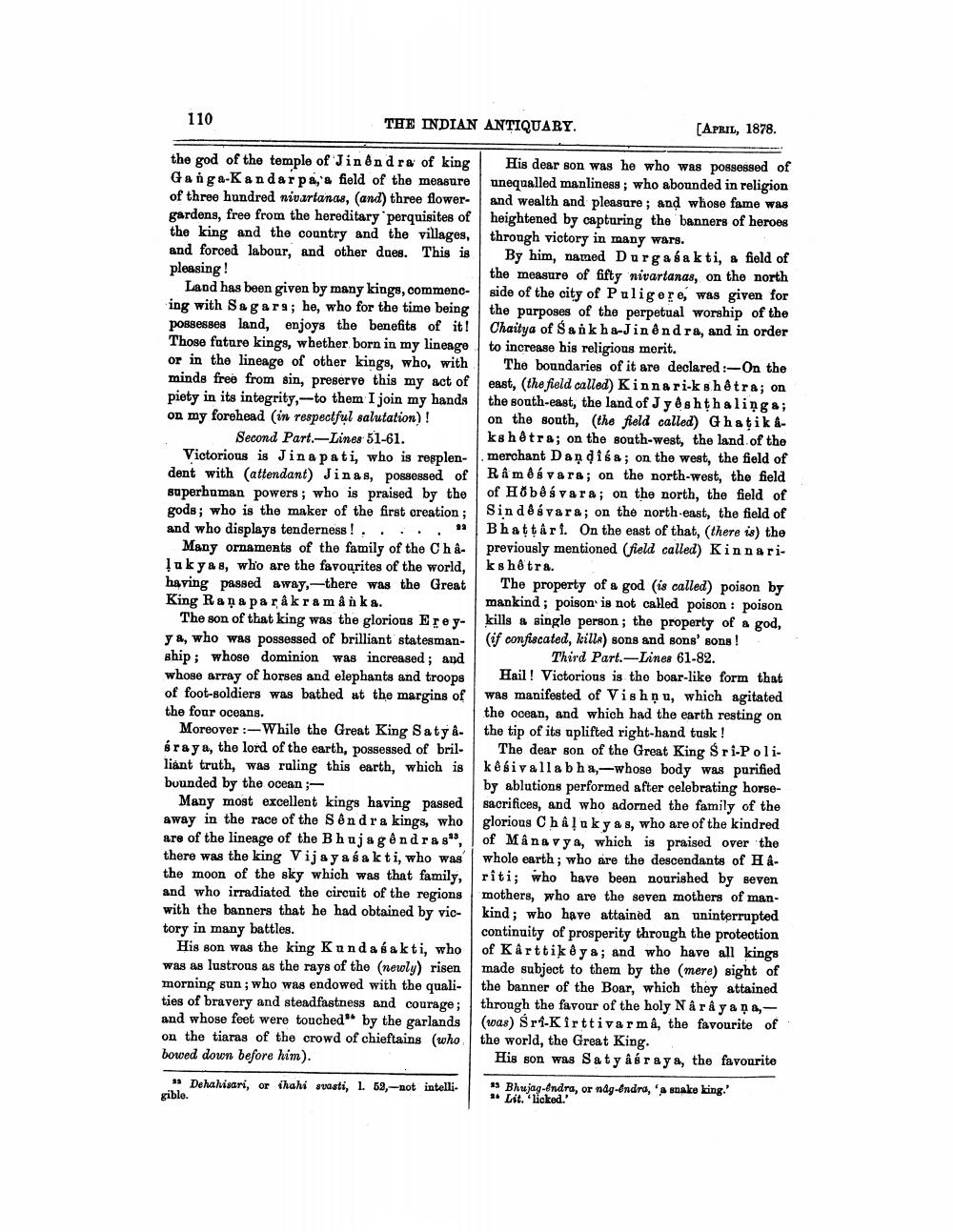________________
110
THE INDIAN ANTIQUARY.
the god of the temple of Jinên dra of king Ganga-Kandarpa, a field of the measure of three hundred nivartanas, (and) three flowergardens, free from the hereditary perquisites of the king and the country and the villages, and forced labour, and other dues. This is pleasing!
Land has been given by many kings, commencing with Sagara; he, who for the time being possesses land, enjoys the benefits of it! Those future kings, whether born in my lineage or in the lineage of other kings, who, with minds free from sin, preserve this my act of piety in its integrity,-to them I join my hands on my forehead (in respectful salutation)!
Second Part.-Lines 51-61.
Victorious is Jin a pati, who is resplendent with (attendant) Jinas, possessed of superhuman powers; who is praised by the gods; who is the maker of the first creation; and who displays tenderness!...
93
Many ornaments of the family of the Châlukyas, who are the favourites of the world, having passed away, there was the Great King Rana paråkra månka.
The son of that king was the glorious Ereyya, who was possessed of brilliant statesmanship; whose dominion was increased; and whose array of horses and elephants and troops of foot-soldiers was bathed at the margins of the four oceans.
Moreover:-While the Great King Satyaśraya, the lord of the earth, possessed of brilliant truth, was ruling this earth, which is bounded by the ocean;
Many most excellent kings having passed away in the race of the Sêndra kings, who are of the lineage of the Bhuja gê ndras, there was the king Vijayasakti, who was the moon of the sky which was that family, and who irradiated the circuit of the regions with the banners that he had obtained by victory in many battles.
gible.
His son was the king Kunda sakti, who was as lustrous as the rays of the (newly) risen morning sun; who was endowed with the qualities of bravery and steadfastness and courage; and whose feet were touched by the garlands on the tiaras of the crowd of chieftains (who bowed down before him).
Dehahisari, or ihahi svasti, 1. 53,-not intelli
[APRIL, 1878.
His dear son was he who was possessed of unequalled manliness; who abounded in religion and wealth and pleasure; and whose fame was heightened by capturing the banners of heroes through victory in many wars.
By him, named Durgasakti, a field of the measure of fifty nivartanas, on the north side of the city of Puligere, was given for the purposes of the perpetual worship of the Chaitya of Sank ha-Jinêndra, and in order to increase his religious merit.
The boundaries of it are declared:-On the east, (the field called) Kinnari-kshetra; on the south-east, the land of Jyeshtha linga; on the south, (the field called) Ghatikakshetra; on the south-west, the land of the merchant Dan disa; on the west, the field of Râmê é vara; on the north-west, the field of Hobês vara; on the north, the field of Sin dêévara; on the north-east, the field of Bhattari. On the east of that, (there is) the previously mentioned (field called) Kinnarikshetra.
The property of a god (is called) poison by mankind; poison is not called poison: poison kills a single person; the property of a god, (if confiscated, kills) sons and sons' sons!
Third Part.-Lines 61-82.
Hail! Victorious is the boar-like form that was manifested of Vishnu, which agitated the ocean, and which had the earth resting on the tip of its uplifted right-hand tusk!
The dear son of the Great King Sri-Polikêsivallabha,-whose body was purified by ablutions performed after celebrating horsesacrifices, and who adorned the family of the glorious Chalukyas, who are of the kindred of Mâna vya, which is praised over the whole earth; who are the descendants of H âriti; who have been nourished by seven mothers, who are the seven mothers of mankind; who have attained an uninterrupted continuity of prosperity through the protection of Kârttikêya; and who have all kings made subject to them by the (mere) sight of the banner of the Boar, which they attained through the favour of the holy Nârâ ya na,(was) Sri-Kirttivar må, the favourite of the world, the Great King.
His son was Satyâéraya, the favourite
3 Bhujag-endra, or nag-endra, a snake king.' 2 Lit. licked.'




